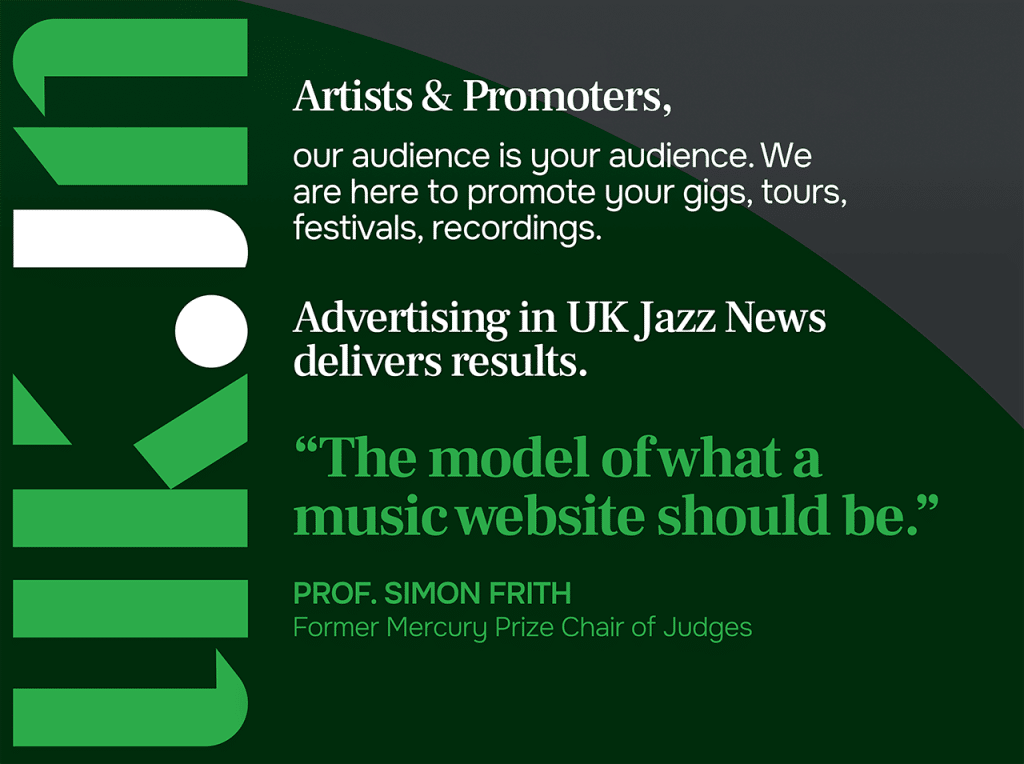Eight European jazz publications are marking #IWD 2024 with portraits of rising female jazz stars across Europe in series called Giant Steps: #Womentothefore. This interview was done by Jacek Brun of jazz-fun.de (*).
Miriam Ast is an international jazz vocalist, band leader and music conservatoire lecturer. She released her debut album Secret Songs with acclaimed British saxophonist Stan Sulzmann in 2018, and subsequently toured the UK and her home country of Germany with pianist Victor Gutierrez. In 2017, she won the Best Vocalist Award and was a semi-finalist at the Shure Montreux Jazz Voice Competition. From 2017 to 2021, she was a lecturer at Leeds Conservatoire in northern England, and since her return to Germany has been teaching jazz singing at the conservatoires in Freiburg and Würzburg. She has formed a new, unconventional trio with jazz pianist Daniel Prandl and crossover cellist Jörg Brinkmann. Her new concept album consists of modern jazz arrangements of folk songs from all over Europe. In this project she draws on her musical and cultural experiences from her time in the UK and explores the rich heritage of Europe with her own distinctive voice.
Miriam now lives in Stuttgart and is slowly establishing herself in the local music scene.
jazz-fun.de: You’re already a fixture on the German and European jazz scene. Can you us something about yourself, and how it all started? Where do you come from musically, and what did you study?
Miriam Ast: My parents say I was singing before I could speak. My father, a music teacher and organist in my home town of Speyer, had a great influence on me through his piano playing and music-making. I sang in his gospel choir at the age of ten, and as a teenager I sang solo in front of large audiences. At the same time, I learnt the saxophone, which led me to jazz and big-band playing. I was also playing saxophone in the Rhineland-Palatinate state youth big band, and singing jazz and gospel in various band projects.
I quickly realised that I have a special gift for touching people when I sing. Feeling fulfilled on stage spurred me on to develop musically. At the age of 18, I knew I wanted to become a professional musician, and after graduating from high school I studied jazz and popular music at the University of Music in Mainz, with jazz saxophone and singing as my two main subjects.
JFD: Which artists and musicians have influenced you the most?
MA: I got into jazz through singers like Diana Krall and Ella Fitzgerald. I was also influenced by classic instrumental jazz albums such as John Coltrane’s Blue Train and Miles Davis’s Kind of Blue. I can still remember the moment I heard Ella Fitzgerald’s scat solo on ‘How High the Moon’ for the first time. I was speechless… that really raised the bar for vocal improvisation for me. On saxophone, I was inspired by musicians like Dexter Gordon, Cannonball Adderley, Dick Oatts and Will Vinson.
The most influential jazz singer and artist for me is the British jazz icon Norma Winstone. I was very lucky to have lessons with her during my Masters in London and to hear her live in various ensembles. Norma’s music is authentic, sensitive and daring: her lyrics tell stories from life and deal with complex themes. And she has an outstanding vocal technique and uses her voice as an instrumental colour.
Despite her international fame, she always seems very modest to me. Every time I hear her live, I am fascinated by how naturally she interacts with her fellow musicians. Among my favourite recordings of hers are the albums Like Song, Like Weather with John Taylor, and Music for Large & Small Ensembles by the Kenny Wheeler Big Band.
Her music speaks to me so much because, with my saxophone background, I’m always looking for ways to transfer the technical demands of instrumental jazz to the voice while conveying more emotion with the lyrics. I wish that many more bands and composers would use the sound colours and abilities of singers in their compositions.
JFD: When did you form your first band?
MA: When I was at school, I had a jazz band with friends and my father, and we performed at openings and parties. Then things really took off in Mainz: my quartet with fellow students, The Ropesh with Lorenzo Colocci, which won the Young German Jazz Prize Osnabrück; the Cathedral Project of the Hessian Jazz Prize winner Vitold Rek with Peter Reiter, pianist of the HR Big Band. And my first journey into folk music as a long-standing feature singer with Klezmers Techter.
JFD: You went to the Royal Academy of Music in 2014 to study for a Master’s degree. How did you feel about your time in England? What special experiences and musical projects did you have there?
Miriam Ast: London was very appealing, offering lots of opportunities, a great cultural scene, and multicultural flair. At the Royal Academy, I was surrounded by the most talented young jazz musicians in the country. One of my fellow students was Jacob Collier, for example, who has since gone on to have a global career.
My time in England challenged me a lot, but above all it encouraged me and helped me progress. I didn’t know anyone in London, and had to build up all my contacts through the Master’s programme and the time that followed. I was also the only singer in my year, and did the same technical exercises and exams as my instrumental fellow students.
My highlights were the concerts at the London Jazz Festivals, for example by Avishai Cohen with Mark Guiliana and Shai Maestro. I was also impressed by masterclasses and ensembles at the Royal Academy with John Taylor, Aaron Parks, Snarky Puppy and Ben Wendel.
JFD: You lived in London for a few years after your studies until 2021. How did everything develop?
Miriam Ast: The diversity of the London jazz scene offered me many opportunities, so I decided to stay there after my Master’s. Although the initial period was challenging, I had some great opportunities at the start of 2017: I got a permanent position as a principal lecturer at Leeds Conservatoire. Here I was also able to set up the jazz choir, with great support from Jamil Sheriff, the head of the jazz department.
In addition to my work as a lecturer, I was active in several formations and projects. Firstly, I was a singer in the London Vocal Project. It was led by jazz pianist, composer and Academy professor Pete Churchill, and we undertook some challenging choral projects. Pete adapted the complete Miles Ahead album by Miles Davis for jazz choir, and wrote the lyrics for it together with the world-famous American jazz singer and poet Jon Hendricks. It was an ambitious project in which we sang highly complex harmonies in an eight-part choir. In the spring of 2017, we sang the world premiere in New York in the presence of Jon Hendricks, who sadly passed away later that year.
In the same year, I won the Best Vocalist Prize at the International Jazz Competition in Bucharest with Spanish jazz pianist Victor Gutierrez. Victor and I had written modern jazz arrangements of jazz standards such as ‘Alone Together’ and ‘Round Midnight’ while I was doing my Masters. The duo gave me the greatest freedom to explore new techniques such as vocal-percussive elements. The award brought us attention on the London scene and more gigs, including at London Jazz Festivals and Ronnie Scott’s Jazz Club. In 2018 we released our debut album Secret Songs on Mons Records (interview link below). During this time, we were particularly supported by Nikki Iles, a great pianist and arranger, and the fantastic pianist Gwilym Simcock. And saxophonist Stan Sulzmann was an important mentor, and we feature him on the album.
JFD: Why did you decide to return to Germany?
MA: Life in London could be a struggle and moved at a very fast pace. From 2016 onwards, the mood in the UK changed due to the Brexit referendum, and there was a great divide between generations and populations. As a European, I felt uncomfortable with the situation and realised how things were becoming more difficult and bureaucratic. It was almost impossible to get scholarships or project funding as a foreigner. I received much more support for my projects via Germany. During this time, I learnt to better appreciate Germany’s cultural funding, healthcare system and general living conditions. But above all I missed my family and friends, as I could only see them very irregularly. So I’d been toying with the idea of moving back for some time. The coronavirus pandemic was the trigger. When travelling between the UK and Germany became almost impossible, the decision was made.
JFD: In 2023, you introduced us to your next album Tales & Tongues. When was it conceived?
MA: I conceived Tales & Tongues in London at the start of 2019. I’d had the idea of folk-song jazz arrangements for some time, and I wrote the arrangement for ‘Danny Boy’ back in 2015. I met jazz pianist Daniel Prandl at a joint concert in Mannheim at the end of 2018. As he had a similar idea, we decided to start a joint project despite the distance.
The concept of arranging folk songs from all over Europe arose from the dichotomy that on one hand I felt very connected to the international scene in London, but on the other I felt rejected by the strong nationalistic currents in the country. That didn’t fit in with how much the UK and London benefited from diversity and exchange. So with this album I wanted to create a counterpoint and show the beauty of cultural diversity and openness.
On the album I present songs from different parts of Europe: the UK, Germany, Hungary, Bulgaria, Sweden, Norway and France. I asked friends, colleagues and students for their favourite folk songs from their home countries. When a melody appealed to me, I started arranging it for the album. It was important to me to sing in the respective languages in order to preserve the essence of the melody and the sound of the language. Hence the title Tales & Tongues.
JFD: How do your compositions come about? What inspires you when composing and arranging your songs?
MA: My compositions are usually created at the piano. With Tales & Tongues, I often came up with a vamp or intro based on the mood of the lyrics or melody, which I then expanded over the verses. I developed new melody parts, time changes, solo parts and chord progressions. I kept the narrative tension, especially in how I treated the melody and harmony. Improvisations for voice, cello and piano alternate with fully composed verses. I also chose the instrumentation carefully. The piano forms the harmonic core, but the cello also acts as a chordal, bass and melody instrument.
Our concerts take the audience on a journey through the diversity of cultures. We create unique moods and soundscapes and tell the stories of the origins of folk songs. We don’t shy away from serious topics such as death, war or loss. We demand a lot from the audience with our interpretations.
JFD: You’ve been living in Stuttgart for a year now. How do you like it there? How have you settled into the music scene?
MA: After a stopover in Freiburg, I moved to Stuttgart at the end of 2022, mainly because the Stuttgart scene is the ideal size. Since then, I’ve made a few musical contacts in the scene and played some great concerts. I’m particularly pleased that my Tales & Tongues Trio has been selected as one of three bands to represent the Baden-Württemberg jazz scene at the Clubnight of the international trade fair jazzahead! in Bremen.
JFD: What do you think about the development of creative music from the perspective of digital media? How do you feel about it?
MA: I find the development difficult. The fast pace of the music market and the almost free availability of music via streaming services has unfortunately devalued the individual work. As artists, we usually spend several years on an album; in the case of Tales & Tongues, I worked on it from 2019 to 2023. It’s frightening that producing an album no longer provides any financial benefit, despite being a big investment. For both of my albums, I covered most of the costs with the help of crowdfunding campaigns. Without that support, the projects wouldn’t have been possible.
I think the sources of income for musicians have completely shifted due to developments in the music market. Nowadays, we only live on what we can earn from concerts and teaching. Having a social-media presence has become crucial to maintain interest and attention. I don’t always find it easy, but I’ve learnt that it’s part of being an artist. If it means I can continue to work as an artist, I’m fine with that.
JFD: What personal goals would you like to achieve?
MA: I hope that I can start many more exciting musical projects with inspiring musicians. Above all, I’d like to continue to cultivate my contacts in England and open up new international band projects. My ideal as an artist is to play fulfilling concerts at festivals and in clubs, and to inspire and support my students. That makes me happy and creates a great balance.
JFD: What music do you listen to privately?
MA: I listen to jazz, especially melodic vocal or instrumental jazz, but I also like groove jazz and R&B, such as by Jacob Collier, Jamie Cullum or Stevie Wonder. Sometimes I also listen to Zen or handpan music to wind down after a long day.
JFD: What is your favourite drink?
MA: Coffee.
JFD: What do you most look forward to?
MA: Weekends off, going hiking in the countryside with my husband, or playing board games with friends and family.
JFD: What do you do on Sundays, or when you’re not playing or making music?
MA: I like to have a big brunch, make plans or read a book.
(*) English version by Julian Maynard-Smith
This article is published simultaneously in the following European magazines, as part of an operation to highlight young jazz and blues female musicians: Citizen Jazz (France), JazzMania (Belgium), Jazz’halo (Belgium), London Jazz News (UK), Jazz-Fun (Germany), Giornale della musica (Italia), In&Out Jazz (Spain) and Donos Kulturalny (Poland).


